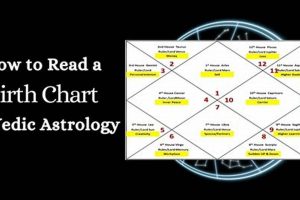The question of comparative astrological accuracy delves into the potential differences in predictive capabilities between Vedic (Jyotish) and Western astrological systems. Vedic astrology, rooted in ancient Indian scriptures, emphasizes the positions of celestial bodies at the time of one’s birth to determine karmic influences and predict life events. Western astrology, evolving from Hellenistic traditions, often focuses on personality traits and psychological interpretations. The core difference lies in their astronomical calculations: Vedic astrology uses a sidereal zodiac based on the fixed constellations, while Western astrology uses a tropical zodiac based on the Earth’s seasons.
Exploring the relative merits of these systems has implications for individuals seeking guidance and self-understanding. Proponents of Vedic astrology often highlight its focus on karmic patterns and remedial measures, arguing for its potential to provide deeper insight into life’s purpose. Western astrology, on the other hand, is frequently praised for its psychological insights, helping individuals understand their personality dynamics and interpersonal relationships. The divergence in calculations can lead to different interpretations of the same birth chart, highlighting the complexities involved in assessing astrological accuracy. Historically, both systems have played significant roles in different cultures, influencing individual beliefs and societal practices.
This discussion serves as a foundation for further exploration into the specific techniques, philosophies, and applications of both Vedic and Western astrology. By understanding the core principles and historical context of each system, individuals can make more informed decisions about their personal engagement with astrological guidance.
Tips for Evaluating Astrological Accuracy
Assessing the accuracy of astrological interpretations requires careful consideration of various factors. The following tips offer guidance for navigating the complexities of astrological systems.
Tip 1: Understand the Astrological System: A thorough understanding of the specific astrological system (Vedic, Western, or other) is crucial. This includes familiarity with its zodiac, house systems, planetary interpretations, and predictive techniques.
Tip 2: Research the Astrologer’s Credentials: Seek qualified astrologers with demonstrated expertise and a strong ethical foundation. Experience and client testimonials can offer valuable insights into their proficiency.
Tip 3: Provide Accurate Birth Data: Accurate birth data (date, time, and location) is essential for accurate chart calculations. Even slight variations can significantly impact interpretations.
Tip 4: Approach Interpretations with Discernment: Astrological interpretations offer potential insights, not definitive predictions. Approach readings with a discerning and critical mindset, integrating the information into one’s own understanding.
Tip 5: Focus on Self-Development: Utilize astrological insights as tools for self-reflection and personal growth. Focus on understanding karmic influences and exploring potential paths for positive development.
Tip 6: Consider Multiple Perspectives: Consulting astrologers from different traditions can provide a broader perspective and a more nuanced understanding of potential influences.
Tip 7: Avoid Over-Reliance: Astrology should be viewed as a guide, not a determinant of destiny. Avoid over-reliance on astrological predictions and maintain personal agency in decision-making.
By following these guidelines, individuals can engage with astrology in a more informed and responsible manner, maximizing its potential benefits for self-understanding and personal growth.
These tips provide a framework for approaching astrological guidance. Further exploration of specific astrological techniques and philosophies can deepen one’s understanding of this complex subject.
1. Sidereal vs. Tropical Zodiac
The distinction between the sidereal and tropical zodiacs forms a central point of divergence between Vedic and Western astrology, directly impacting the perceived accuracy of each system. This fundamental difference in celestial frameworks influences planetary placements and interpretations, raising questions about which system provides a more precise reflection of individual characteristics and life events. Understanding this core distinction is essential for evaluating the potential accuracy of both Vedic and Western astrological predictions.
- Ayanamsha (The Shifting Point)
The ayanamsha, representing the gap between the sidereal and tropical zodiacs, accounts for the precession of the equinoxes the gradual shift of the Earth’s rotational axis. Various ayanamsha calculations exist, each impacting planetary placements in a Vedic birth chart compared to its Western counterpart. For instance, someone born on the cusp of a sign in the tropical zodiac might find themselves firmly within a different sign in the sidereal zodiac due to the ayanamsha. This difference can lead to divergent interpretations of personality traits, strengths, and weaknesses, raising questions about which system offers a more accurate representation of the individual.
- Planetary Placements
The choice of zodiac directly affects the positioning of planets within a birth chart. For example, a planet considered to be in Aries in the tropical zodiac might be placed in Pisces in the sidereal zodiac. This shift can lead to different interpretations of planetary influences. A planet in Aries typically signifies assertive and independent qualities, while a placement in Pisces may suggest greater sensitivity and intuition. The question of which placement more accurately reflects an individual’s lived experience contributes to the debate surrounding astrological accuracy.
- Predictive Accuracy
The differing planetary placements resulting from the zodiacal distinction influence the timing and nature of predicted events. A transit, or the movement of a planet through the zodiac, will occur at different times depending on the zodiac used. This can lead to variations in predicted timelines for significant life events, raising questions about which system provides a more accurate forecast. For example, a predicted career change might manifest at different times based on whether a Vedic or Western astrologer interprets the chart.
- Personal Experience
Ultimately, the perceived accuracy of a particular astrological system is often based on personal experience and resonance with the interpretations offered. Some individuals may find that Vedic astrology’s sidereal framework resonates more deeply with their lived experience, while others may find greater alignment with Western astrology’s tropical zodiac. This subjective element further complicates the objective assessment of astrological accuracy.
The sidereal vs. tropical zodiac debate highlights the inherent complexities in evaluating astrological accuracy. The choice between these frameworks significantly impacts interpretations and predictions, underscoring the importance of understanding these differences when exploring the potential insights offered by both Vedic and Western astrology. Further research into specific predictive techniques within each system can provide a more nuanced understanding of their respective strengths and limitations.
2. Planetary Interpretations
Planetary interpretations constitute a core element in assessing the comparative accuracy of Vedic and Western astrology. Differing perspectives on planetary influences contribute significantly to variations in astrological readings. Examining these distinctions provides crucial insight into the potential strengths and limitations of each system, ultimately informing the ongoing discussion regarding their respective accuracy.
- Ruling Planets and Dignities
Vedic astrology emphasizes planetary rulerships and dignities, attributing specific qualities and strengths to planets based on their placement within the zodiac. For example, Mars ruling Aries signifies assertive energy, while Venus ruling Libra highlights relational harmony. These dignities, including exaltation, debilitation, and mooltrikona signs, influence planetary strength and effectiveness, offering nuanced interpretations absent in Western approaches. This difference can lead to divergent predictions regarding the impact of planetary transits and periods, influencing assessments of astrological accuracy. For example, a debilitated Mars in a Vedic chart might suggest suppressed assertiveness, while its placement in a Western chart lacking this concept may not convey the same nuance.
- Nakshatras (Lunar Mansions)
Vedic astrology utilizes nakshatras, a system of 27 lunar mansions dividing the zodiac into finer segments. Each nakshatra possesses unique qualities influencing planetary interpretations. For example, the Moon placed in the nakshatra of Ashwini, ruled by the Ashwini Kumaras, may indicate a healing and nurturing energy, whereas its placement in Bharani, ruled by Yama, could signify transformative experiences. Western astrology typically does not incorporate such detailed lunar mansions, potentially overlooking subtle nuances in planetary influences. This distinction further differentiates predictive methodologies and influences the perceived accuracy of each system.
- Planetary Periods (Dashas)
Vedic astrology employs planetary periods, or dashas, to predict the timing of specific life events based on planetary cycles. Each dasha highlights the influence of a particular planet, shaping the individual’s experiences during that timeframe. For example, a Jupiter dasha often indicates growth and expansion, while a Saturn dasha may bring challenges and lessons. Western predictive techniques typically do not employ such structured planetary periods, leading to different interpretations of timing and event prediction. Consequently, the perceived accuracy of each system diverges based on the alignment of predicted events with lived experience.
- Remedial Measures (Upayas)
Vedic astrology offers remedial measures, or upayas, to mitigate challenging planetary influences. These practices, including gemstone recommendations, mantras, and rituals, aim to harmonize planetary energies and improve life circumstances. Western astrology generally does not incorporate such prescriptive remedies, focusing more on psychological interpretations and self-awareness. The presence of remedial measures in Vedic astrology provides a unique dimension to its predictive capabilities and contributes to its perceived accuracy by offering proactive approaches to navigate life’s challenges.
These variations in planetary interpretation contribute significantly to the perceived differences in accuracy between Vedic and Western astrology. By understanding these distinctions, individuals can better evaluate the respective strengths and weaknesses of each system, fostering a more informed approach to astrological guidance and its potential insights. Further investigation into specific case studies comparing interpretations and predictions can offer a more nuanced understanding of these complexities.
3. Predictive Techniques
Predictive techniques form the core of astrological practice, serving as the primary tools for assessing potential future outcomes and contributing significantly to the ongoing debate regarding the comparative accuracy of Vedic and Western astrology. An examination of these techniques provides essential insights into the methodologies employed by each system and clarifies their potential strengths and limitations in forecasting life events.
- Transits and Planetary Periods (Dashas)
Vedic astrology utilizes a unique combination of transits (planetary movements through the zodiac) and planetary periods (dashas) to predict the timing of specific events. Dashas allocate specific timeframes to the influence of individual planets, providing a framework for understanding the unfolding of karmic patterns. For example, a Jupiter dasha might coincide with a favorable transit, indicating a period of growth and opportunity. Western astrology primarily relies on transits, lacking the structured timeframe provided by dashas. This difference in predictive methodology impacts the specificity and timing of predictions, contributing to the ongoing discussion regarding comparative accuracy.
- Annual Charts (Varshaphal) and Divisional Charts
Vedic astrology employs annual charts (Varshaphal), calculated based on the solar return, to predict the trends and events of a specific year. Divisional charts (vargas), providing insights into specific areas of life, further refine predictive accuracy. For example, the Navamsa chart offers insights into marriage and partnerships. Western astrology also utilizes solar return charts, but the incorporation of divisional charts and the detailed analysis of planetary periods in Vedic astrology offer a potentially more nuanced predictive framework. This granular approach may enhance the accuracy of predictions by considering multiple layers of astrological influence.
- Progressions and Directions
Western astrology utilizes progressions and directions, techniques simulating planetary movement over time, to forecast future trends and events. For example, secondary progressions advance the birth chart by one day for each year of life, symbolizing the unfolding of individual potential. While Vedic astrology also incorporates some forms of progressions, its primary focus on transits and dashas differentiates its predictive approach. Comparing the accuracy of these methods requires examining specific predictive outcomes and their alignment with actual life events.
- Eclipses and Planetary Alignments
Both Vedic and Western astrology consider eclipses and significant planetary alignments as potent influences on individual and collective destinies. However, the interpretation and weighting of these events may differ. Vedic astrology often places greater emphasis on the karmic implications of eclipses, while Western astrology may focus on their psychological and emotional impact. These differing interpretations impact predictions related to major life changes and turning points, influencing perceptions of accuracy. Assessing the validity of these predictions requires longitudinal studies comparing predicted outcomes with observed events.
The diversity of predictive techniques employed by Vedic and Western astrology contributes significantly to the ongoing debate concerning their comparative accuracy. By understanding these methodologies and their underlying principles, individuals can engage with astrological predictions more critically and develop a more nuanced perspective on their potential value and limitations. Further research comparing predictive outcomes across both systems is necessary to gain a more comprehensive understanding of their respective strengths and weaknesses.
4. Karmic Emphasis
The concept of karma forms a central pillar of Vedic astrology, deeply influencing its predictive methodology and interpretations. This emphasis on karmic influences distinguishes Vedic astrology from Western traditions, contributing to the ongoing discussion regarding comparative accuracy. Vedic astrology posits that past actions create karmic imprints influencing present circumstances and future outcomes. This cause-and-effect relationship, viewed through the lens of planetary placements and periods (dashas), provides a framework for understanding life events as manifestations of past karma. For example, a challenging Saturn period might be interpreted as a time for karmic reckoning, offering opportunities for growth and resolution of past actions. Conversely, a benefic Jupiter period may indicate the fruition of positive karmic patterns. This focus on karmic consequences provides a unique perspective on the unfolding of life’s trajectory, shaping interpretations of astrological charts and predictions.
The practical significance of this karmic understanding lies in its potential to empower individuals to take responsibility for their actions and create a more positive future. Vedic astrology offers remedial measures (upayas) designed to mitigate negative karmic influences and enhance positive ones. These practices, ranging from charitable acts to mantra recitation, aim to harmonize planetary energies and improve life circumstances. For instance, performing acts of service during a challenging Saturn period might be suggested to alleviate karmic burdens and foster personal growth. While Western astrology acknowledges the influence of past experiences, its emphasis on psychological interpretation differs significantly from Vedic astrology’s karmic focus. This distinction highlights the potential for Vedic astrology to offer deeper insights into the root causes of current circumstances and empower individuals to navigate life’s challenges with greater awareness and agency.
In summary, the karmic emphasis in Vedic astrology provides a unique lens for understanding the unfolding of life events and individual destinies. This perspective differentiates Vedic astrology from Western traditions, contributing to the debate surrounding predictive accuracy and the potential for personal transformation. While the concept of karma remains a complex and nuanced philosophical principle, its integration within Vedic astrology offers a framework for exploring the interconnectedness of past actions, present experiences, and future possibilities. Further research into the efficacy of remedial measures and their impact on individual lives could shed more light on the practical applications of this karmic understanding.
5. Remedial Measures
Remedial measures, or upayas, constitute a distinctive feature of Vedic astrology, directly addressing the question of its comparative accuracy. Unlike Western astrology’s focus on psychological interpretation, Vedic astrology offers prescriptive practices intended to mitigate perceived negative planetary influences and enhance positive ones. This proactive approach, rooted in the karmic framework of Vedic thought, raises questions about the potential to influence destiny and improve life outcomes, contributing to the ongoing discussion regarding Vedic astrology’s predictive accuracy and practical applications.
- Gemstone Recommendations
Gemstone recommendations represent a widely practiced remedial measure in Vedic astrology. Specific gemstones are associated with particular planets, and wearing a designated gem is believed to strengthen the positive influences of that planet or mitigate its negative effects. For example, wearing a yellow sapphire is often recommended to enhance the beneficial influence of Jupiter. The efficacy of gemstone remedies remains a subject of debate, with proponents citing anecdotal evidence and traditional texts, while skeptics question the scientific basis for such practices. This debate contributes directly to the larger discussion of whether Vedic astrology’s inclusion of remedial measures enhances its predictive accuracy or represents a departure from empirical observation.
- Mantra Recitation and Prayers
Mantras, sacred sounds or phrases, and specific prayers are often prescribed as remedial measures in Vedic astrology. Reciting particular mantras is believed to invoke the energies of specific deities or planets, promoting harmony and mitigating negative influences. For example, chanting the Gayatri Mantra is considered a potent practice for invoking blessings and enhancing spiritual well-being. Similar to gemstone recommendations, the effectiveness of mantras and prayers is a subject of ongoing discussion, with proponents emphasizing their vibrational qualities and psychological benefits, while skeptics question their direct impact on observable outcomes. This debate contributes to the broader inquiry into whether such practices genuinely influence life events or primarily serve as psychological tools.
- Ritualistic Practices (Yagyas and Pujas)
Yagyas (fire ceremonies) and pujas (ritualistic worship) represent more elaborate remedial measures in Vedic astrology. These ceremonies, often performed by trained priests, invoke specific deities and planetary energies, seeking blessings and mitigating negative karmic influences. For example, performing a Navagraha Puja is believed to appease the nine planets and harmonize their influences. The effectiveness of these ritualistic practices remains a subject of discussion, with proponents citing traditional beliefs and anecdotal evidence, while skeptics question the empirical basis for their purported impact. This ongoing debate contributes to the broader question of Vedic astrology’s predictive accuracy and whether ritualistic practices influence destiny or primarily serve as symbolic expressions of devotion.
- Charitable Acts and Service
Charitable acts and selfless service are often recommended as remedial measures in Vedic astrology, particularly to mitigate the effects of challenging planetary placements. Performing acts of kindness and contributing to the welfare of others is believed to generate positive karma and mitigate negative karmic influences. For example, donating food or clothing to those in need might be suggested as a remedy during a challenging Saturn period. While the ethical and social benefits of such actions are widely acknowledged, their direct impact on astrological influences remains a subject of debate. This discussion contributes to the larger question of whether Vedic astrology’s emphasis on karmic remedies enhances its accuracy by promoting positive actions or represents a subjective interpretation of life events.
The inclusion of remedial measures in Vedic astrology significantly distinguishes it from Western traditions and directly influences the discussion surrounding its comparative accuracy. While skeptics question the empirical basis for these practices, proponents argue that they offer valuable tools for navigating life’s challenges and fostering personal growth. Ultimately, the effectiveness of remedial measures remains a subject of ongoing debate, requiring further research and critical analysis to fully understand their potential impact on individual lives and their contribution to the broader question of Vedic astrology’s predictive capabilities.
Frequently Asked Questions
This section addresses common inquiries regarding the comparative accuracy of Vedic astrology.
Question 1: Does Vedic astrology offer more accurate predictions than Western astrology?
Comparative accuracy remains a complex and debated topic. Both systems offer unique perspectives and predictive methodologies. Vedic astrology’s emphasis on karmic influences and detailed planetary periods (dashas) may provide insights into the timing of specific life events, while Western astrology’s focus on psychological dynamics may offer greater understanding of personality and relationships. Ultimately, perceived accuracy depends on individual experiences and interpretations.
Question 2: How does the sidereal zodiac used in Vedic astrology affect predictive accuracy?
The sidereal zodiac, based on the fixed constellations, distinguishes Vedic astrology from Western astrology’s tropical zodiac, which aligns with the Earth’s seasons. This fundamental difference results in varying planetary placements and influences interpretations of transits and planetary periods. Whether the sidereal zodiac enhances predictive accuracy remains a subject of ongoing debate.
Question 3: Do remedial measures in Vedic astrology improve predictive outcomes?
Remedial measures (upayas), such as gemstone recommendations and mantra recitation, aim to mitigate negative planetary influences. Their effectiveness remains a subject of discussion. While proponents cite anecdotal evidence and traditional texts, skeptics question their empirical basis. Whether these practices genuinely influence outcomes or primarily offer psychological benefits requires further investigation.
Question 4: Can an individual’s birth chart accurately predict their future?
Astrological charts offer potential insights into personality traits, karmic patterns, and life trends, not definitive predictions. Individuals retain free will and agency. Approaching astrological interpretations with discernment and utilizing them as tools for self-reflection rather than fatalistic pronouncements empowers informed decision-making.
Question 5: How does the concept of karma influence predictive accuracy in Vedic astrology?
Vedic astrology views life events through a karmic lens, interpreting current circumstances as manifestations of past actions. This perspective influences predictive methodologies and interpretations. While the concept of karma remains complex, its integration within Vedic astrology offers a framework for understanding life’s trajectory and potential for growth.
Question 6: What factors should be considered when evaluating the accuracy of an astrological reading?
Evaluating accuracy requires considering the astrologer’s expertise, the specific astrological system employed, and the individual’s birth data accuracy. Approaching interpretations with a discerning mindset, focusing on self-development, and avoiding over-reliance on predictions promote a balanced and informed perspective.
These frequently asked questions offer a starting point for further exploration into the complexities of astrological accuracy. Critical thinking and personal research remain essential for navigating the diverse perspectives and interpretations within the field of astrology.
This concludes the FAQ section. Further sections may delve into specific case studies or comparative analyses of Vedic and Western astrological techniques.
Comparative Astrological Accuracy
The question of whether Vedic astrology demonstrates greater accuracy compared to Western systems remains a complex and nuanced inquiry. This exploration has highlighted key distinctions, including the use of the sidereal zodiac, the emphasis on karmic influences, the incorporation of planetary periods (dashas), and the application of remedial measures. These factors contribute to Vedic astrology’s unique predictive methodology and interpretive framework, differentiating it from Western traditions. While proponents often cite the depth of Vedic astrology’s insights and its potential for proactive intervention through remedial measures, a definitive assessment of comparative accuracy necessitates further research and critical analysis, acknowledging the subjective nature of astrological interpretation.
Ultimately, the pursuit of astrological understanding requires a discerning and balanced approach. Acknowledging the limitations of predictive methodologies while appreciating the potential insights offered by both Vedic and Western traditions allows for a more informed engagement with astrological guidance. Continued research, open dialogue, and a focus on empirical observation are crucial for advancing the understanding of astrological systems and their potential contributions to self-awareness and personal growth. Rather than seeking definitive pronouncements of superior accuracy, embracing critical inquiry and fostering respectful discourse among diverse astrological perspectives can facilitate a more comprehensive appreciation of the rich tapestry of astrological knowledge.







